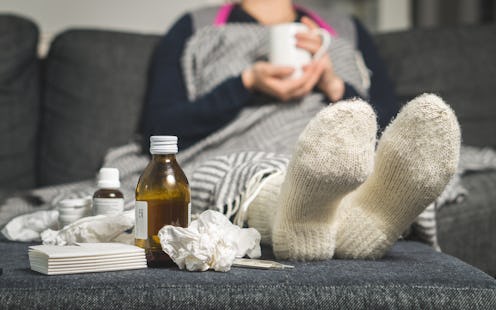Life
6 Ways To Protect Yourself If Someone You're Living With Has The Flu
As you may have heard, the Center for Disease Control is warning of a more intense flu season than expected. Incidence of the illness — caused by strains of influenza virus, primarily affects one's respiratory system (nose, throat, and, in some cases, lungs) — has spread to almost epidemic levels. The illness can be particularly difficult to manage due to the ease of which it spreads; which is why it is so important to know how to avoid getting the flu when someone in your house has it.
Plus, the influx of cases is happening earlier in the season than usual in the United States. In fact, according to a weekly flu activity map, only three states (Delaware, Maine, and Montana) are "minimally affected" by the explosion of cases. And if history serves as any indication, the worst of the outbreak may be yet to come.
So how do you protect yourself? The most important step the CDC advises everyone take is receiving flu vaccinations. You can use this nifty little widget to find out where to get one. Other preventative measures include washing your hands frequently, covering your coughs and sneezes, and avoiding others who may be sick.
All these suggestions seem pretty easy to follow. Carrying a pack of tissues, avoiding sharing drinks, and staying clear of busy public places for a few weeks can't be too difficult, right? But what happens when someone you live with gets the flu? Here are some tips for how to protect yourself:
1. Get A Flu Shot
Earlier this week, Director of the CDC Dr. Brenda Fitzgerald reinforced the importance of obtaining a flu vaccine. The vaccine uses a virus grown in an egg to provide the recipient's body with antibodies, and typically protects against three strains: H1N1, H3N2, and Influenza B. While it is not a magic suit of armor that will guarantee you stay flu-free, as many as of 85 percent of the children who have died from flu this year were unvaccinated. Healthcare professionals agree it is the best way to decrease your chances.
2. Wash Your Hands Thoroughly And Frequently
Attentive hand-washing is a surefire way to ditch all the germs you unknowingly collect throughout your day. The Mayo Clinic advises individuals not only wash obviously dirty hands, but also before coming into contact with food and after coughing or blowing your nose, among other things. You can find their full guide to hand hygiene here.
3. Keep Your Home Clean
Make sure to clean and disinfect surfaces everyone in your home shares, and knobs everyone touches. Opt for paper (or other disposable) towels over dishrags and choose tissues over a handkerchief. Take out garbage in a timely fashion. Remember to never mix ammonia and bleach.
4. Boost Your Own Immunity
Even those with the strongest immune systems can catch a flu virus, but individuals with weakened immunity (babies, the elderly, those on certain medications) are at greater risk. Habits like eating fruits and vegetables, exercising, getting enough sleep can help boost you up.
5. Don't Be Afraid To Cancel Plans
Maybe flu season isn't the best time to go on that shopping spree with your best friend. Malls, concerts, airports, stadiums, and any other densely populated place is teeming with germs. Its more than likely you will come into contact with someone sick while in attendance.
6. Avoid Your Ailing Cohabiter
If someone in your house is showing symptoms of, or has officially been diagnosed with the flu, they are advised to stay home for "at least 24 hours after [their] fever is gone." It is hard to avoid someone with whom you live altogether, but extra caution should be taken to avoid contact. especially because it has recently been discovered that flu germs can be transmitted simply through breathing. So keep your distance and maybe look into wearing a face mask. If surgeons wear them in operating rooms, they can't hurt.
This year's flu season is scary; even scarier when you live with someone ill. But following a few extra precautions may make all the difference when it comes to getting through the season sans sickness.
